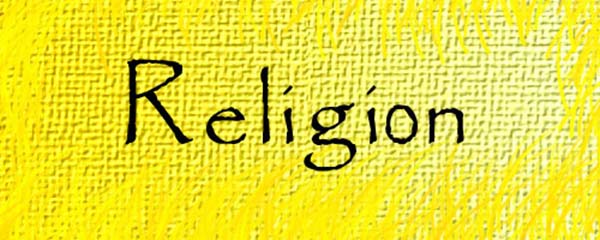If you were born in Saudi Arabia, you’d hold the tenets of Islam sacred and aver that Christian belief was wrong; if you were born in Mississippi, you’d have exactly the opposite view. How can you think your belief is right if it would differ depending on the conditions of your upbringing?
Hans Kung, a Swiss Catholic priest and theologian, asks this question “Is there one true religion?” From the outside (objectively) there are many true religions; from the inside (subjectively) there is only one. According to Kung, Christians over the centuries have fallen into untrue religion. Prophets have had to arise in the Church and “enlightened ones” outside the Church to call the faithful back to this truth, “among whom the prophet Muhammad and the Buddha should no doubt be included par excellence.” Kung says a genuine religion must have an orientation to the human element, but that does not mean that it must be reduced to “merely human.” Religion is convincing when it succeeds in bringing out the “human element against the background of the Absolute.”
Thus, according to Kung, insofar as a religion serves the virtue of humanity, supports human beings in their dignity, and allows them to gain meaningful and fruitful existence, it is a true and good religion. But if religion spreads inhumanity and hinders human beings in their human identity and meaningfulness, prevents them from achieving a meaningful and fruitful existence, it is a false and bad religion.
Kung also makes it clear that the truth in Christianity does not exclude the truth in other religions. They are all conditionally true religions as long as they do not contradict the essential Christian message; in fact, other religions can “complete, correct and enrich the Christian religion.” In the end no religion will be left standing, not even Christianity, Kung asserts, but the one “Inexpressible” to whom all religions are oriented. Even Jesus Christ will no longer stand as a separate figure; Paul says, “When everything is subjected to him, then the Son himself will be subjected to the one who subjected everything to him, so that God may be all in all.
According to John Hick, an English philosopher of religion, each of the religions of the world are various culturally conditioned human responses to what he calls the Real. Yet because the Real is ineffable, the various religions of the world are not there to pass on “truths” concerning the Real, but to act as contexts in which human salvation can take place. Although each religious tradition would distinguish itself from the others by seeing itself as superior to them, this claim cannot be validated when we see that religious history reveals no distinguishable difference between each of them, so as to suppose the moral superiority of one above the others.
One more way of responding to the conflicting claims of the different traditions is to remain committed to the truth of one set of religious teachings while at the same time agreeing with some of the central concerns raised by pluralism. Religious relativism provides such a response. For religious relativism, as articulated by Joseph Runzo, the correctness of a religion is relative to the worldview of its community of adherents. On this view, each of the religious traditions are comprised of various experiences and mutually incompatible truth claims, and the traditions are themselves rooted in distinct worldviews that are incompatible with the other worldviews. Runzo maintains that these differing experiences and traditions emerge from the plurality of phenomenal realities experienced by the adherents of the traditions. On this relativistic view, one’s worldview determines how one comprehends and experiences Ultimate Reality.
John Schellenberg has argued that “the hiddenness of God” provides evidence that God does not in fact exist. Using a child-parent analogy, an analogy which is often used in the Abrahamic traditions themselves, Schellenberg notes that good parents are present to their children, especially when they are in need. But God is nowhere to be found, whether one is in need or not. So God, at least as traditionally understood, must not exist. Hence, according to him there exists no religion.
Bertrand Russell was an agnostic believing there is no God. As London lady suggested to him, at his 90th birthday party, that he was not only the world’s most famous atheist but, by this time, very probably the world’s oldest atheist. “What will you do, Bertie, if it turns out you were wrong?” she asked. “I mean what if – uh - when the time comes, you should meet Him? What will you say?” Russell was delighted with the question. His bright, birdlike eyes grew even brighter as he contemplated this possible future dialogue, and then he pointed a finger upward and cried, “Why, I should say, ‘God, you gave us insufficient evidence.”‘
We do not know which view is ultimately correct – if any of them are, and for Hick Ultimate Reality is far beyond human conceptions – since we do not have a “God’s eye” perspective by which to make such an assessment. One common illustration of the pluralist position of experiencing God is the Hindu parable of the blind men and the elephant. In this parable, God is like an elephant surrounded by several blind men. One man felt the elephant’s tail and believed it to be a rope. Another felt his trunk and believed it to be a snake. Another felt his leg and believed it to be a tree. Yet another felt his side and believed it to be a wall. Each of them experience the same elephant but in very different ways from the others. In our experiences and understandings of Ultimate Reality, we are very much like the blind men, argue such religious pluralists, for our beliefs and viewpoints are constricted by our concepts.

